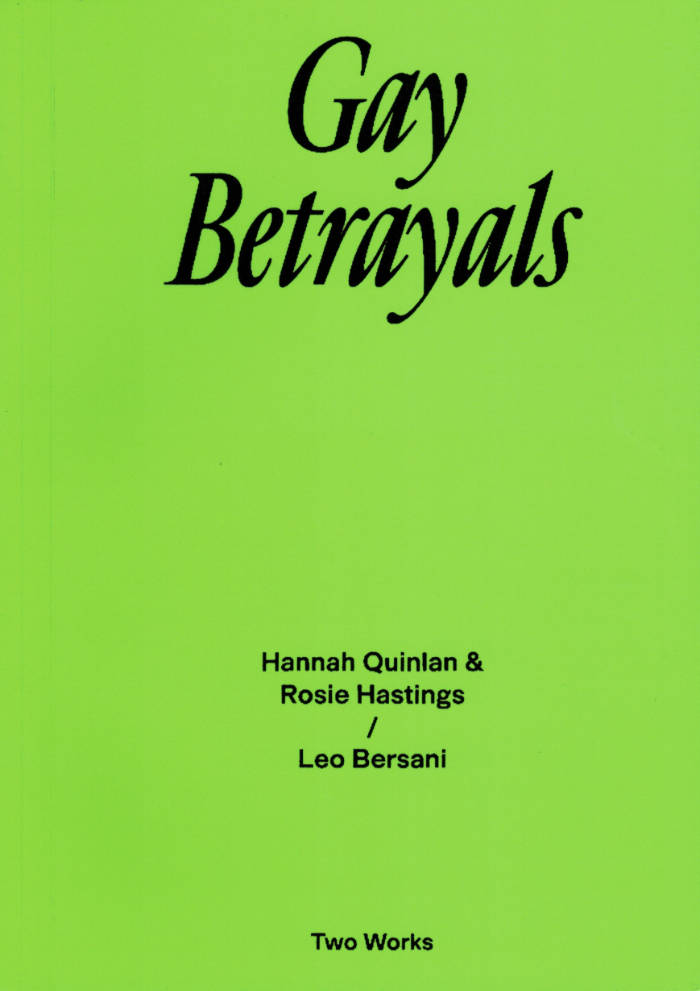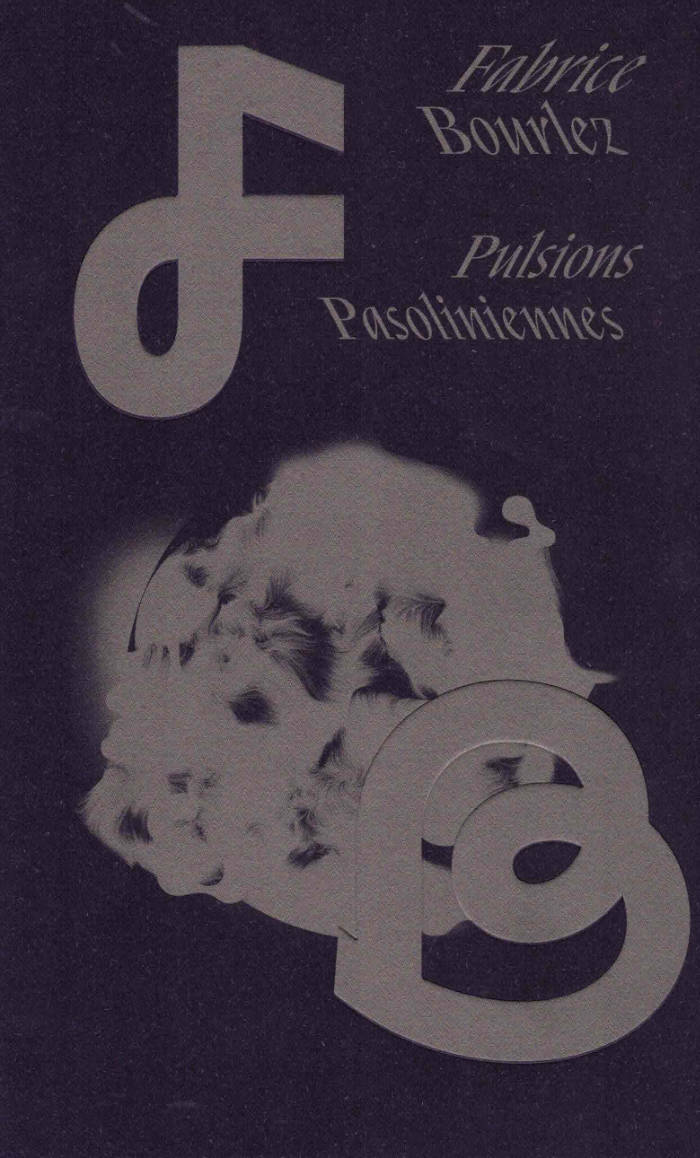Leo Bersani
Leo Bersani

Gay Betrayals: Two Works Series Vol. 5
Leo Bersani, Hannah Quinlan and 1 more
Bersani’s prescient and long unavailable polemic against gay assimilation, a plea for “antimonogamous promiscuity,” illustrated with artistic interventions
In 1997, during a symposium at Centre Pompidou, pioneering queer theorist Leo Bersani presented a prescient critique of the assimilative tendencies that made “gays melt into the very culture they like to think of themselves as undermining.” For Bersani, queer activism, mired in micropolitics, had relinquished the radical task of reconfiguring the horizon of the possible. Later published as “Gay Betrayals” in the pioneering (and now unavailable) collection Is the Rectum a Grave?, Bersani’s intervention champions a truly disruptive vision of homosexuality, one that betrays the relational, identitarian and communitarian foundations of bourgeois heterosexual respectability through “antimonogamous promiscuity.”
Building on artistic research into the politics of queer spaces and culture some 20 years later, British artist duo Hannah Quinlan and Rosie Hastings revisit Bersani’s polemic with a response in three acts. Through a kaleidoscopic array of drawings, preparatory sketches and egg tempera paintings, a narrative of everyday (homo)sociality emerges.
Leo Bersani (1931–2022) was an American theorist best known for his books Is the Rectum a Grave?, Homos and Receptive Bodies. Born in the Bronx, he graduated from Harvard in 1952 and eventually joined the University of California, Berkeley, where he became an influential teacher, remaining there for the rest of his career.
And more

Pulsions pasoliniennes
An original reading of Pier Paolo Pasolini's work and “impulses”, between aesthetic and psychoanalytic reflection.
Une lecture originale du corpus et de la biographie de Pier Paolo Pasolini, sous le signe de l'éthique et des « pulsions » qui y sont à l'œuvre, entre réflexions esthétique et psychanalytique.
Relue à l'aune de la psychanalyse et des théories queer, l'œuvre de Pier Paolo Pasolini constitue un Dehors fertile pour la réflexion contemporaine. Pour faire face à l'apathie, pour affronter la souffrance, pour réveiller la réalité désabusée, comment tirer parti de la descente aux enfers pasoliniens ? Comment son travail peut-il aider à mieux appréhender le contemporain sans le condamner d'une traite ? Pasolini aimait se définir comme « une force du passé ». Il ne faut pas laisser sombrer sa lutte contre le conformisme petit bourgeois et le développement du capitalisme dans un conservatisme quelconque. La lutte pasolinienne, son combat au corps-à-corps avec la langue, le visible, le dicible ne peut rester vain.
Re-lire et re-revoir Pasolini pour nommer le contemporain : le chantier est vaste, d'autant plus imposant qu'il est resté inachevé. Films, pièces de théâtre, romans, poésies, essais... en chaque lieu, surgit la suspension des certitudes bien-pensantes et résonnent les voix des sans-voix : ragazzi, prostituées, spectres, lucioles, sous-prolétariat du monde entier. S'ensuit une série de questions déterminantes pour l'actualité de la pratique psychanalytique et de la pensée. Comment (se) dit-on ? Comment (se) réfléchit-on ? Comment (se) désire-t-on ? Où et comment retrouver un peu de « grande santé » ? Où et comment trouver un nouveau cap ?
D'Edipo Re à Salo, d'Orgia à Petrolio, de Comizi d'amore aux Ecrits corsaires, Pasolini décline des corps, des visages, des personnages animés par des pulsions qui ne cessent d'inventer une logique mettant au défi le moralisme de l'autorité paternelle. Ces pulsions répètent sans cesse un même échec. Que signifie cette omniprésence de l'échec, l'insistance de la foirade tant dans l'œuvre filmée qu'écrite ? Comment articuler le refus du père pasolinien avec son attachement revendiqué à l'œuvre freudienne? Répondre à ces questions, c'est entrer dans la poétique même de l'écriture pasolinienne et dans des questions psychanalytiques de la plus brûlante actualité.
Rapprocher Pasolini de la psychanalyse et des théories du genre ne vise ni à psychologiser son œuvre, ni à faire du poète un précurseur des idéologies queer. S'emparer des pulsions pasoliniennes, c'est, bien plutôt, mettre au travail la praxis par les idéologies : réveiller l'écoute analytique, les idéologies queer et l'esthétique pasolinienne.
L'essai se veut une porte d'entrée pour comprendre l'éthique à l'œuvre chez Pasolini et dans la pratique de l'inconscient. Son champ référentiel principal est le corpus pasolinien analysé à partir de l'œuvre freudienne et des apports lacaniens ainsi que de leurs reprises par les avancées des théories du genre (Teresa de Lauretis, Leo Bersani, Gayle Rubin...).

Reading / Feeling
Frédérique Bergholtz, Tanja Baudoin
Reading / Feeling examines affect, a term that delineates a field where the personal and political meet in sensory movements between bodies. A pre-emotional experience, affect constitutes the social and economic relationships that make up the fabric of society. Reading / Feeling considers the meaning of affect in theory and artistic practice through texts by theoreticians, artists, and curators read in If I Can’t Dance’s Reading Groups in Amsterdam, Toronto, and Sheffield as part of the programme for Edition IV – Affect (2010–12). It also includes three new essays, short statements by Reading Group members, and artist pages.
Contributors: Sara Ahmed, Rhea Anastas, Lauren Berlant, Leo Bersani, Lone Bertelsen, Gregg Bordowitz, Judith Butler, Jeremiah Day, Gilles Deleuze, Lucien Febvre, Simone Forti, Adam Frank, Andrea Fraser, Félix Guattari, Michael Hardt, Sharon Hayes, Brian Holmes, Jutta Koether, Glenn Ligon, Brian Massumi & Mary Zournazi, Helen Molesworth, Andrew Murphie, Sina Najafi & David Serlin, George Orwell, Emily Roysdon, Eve Kosofsky Sedgwick, Baruch Spinoza, Susan Sontag, Jan Verwoert; it also includes: essays by Tanja Baudoin, Emma Cocker, Jacob Korczynski; contributions by Reading Group members Stephen Bowler, Alison J Carr, Belen Cerezo, Jon Davies, Anik Fournier, Victoria Gray, Linda Kemp, Wjm Kok, Janice McNab, Gabrielle Moser, Cecilia Paldino, Andrew James Patterson, Hester Reeve, Julie Swalloa, cheyanne turions, Vivian Ziherl; and artist pages by Matthew Lutz-Kinoy.